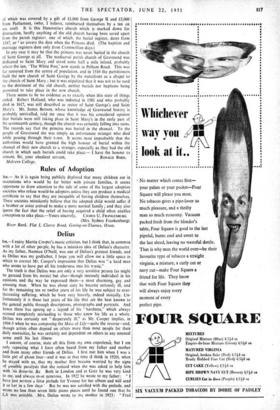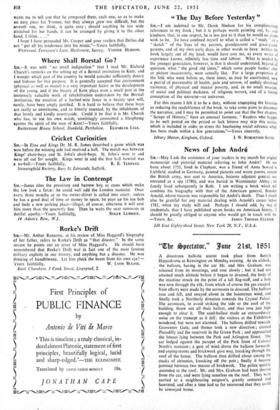Delius
SIR —I enjoy Martin Cooper's music criticism, but I think that, in common with a lot of other people, he has a 'mistaken idea of Delius's character. As my father, Norman O'Neill, was one of Delius's greatest friends, and as Delius was my godfather, I hope you will allow me a little space in which to correct Mr. Cooper's impression that Delius was " a hard man who seems to have put all his tenderness into his rrusic."
The truth is that Delius was aot only a very sensitive person (as might be guessed from his music) but also—though intensely individual in his opinions and the way he expressed them—a most charming, gay and amusing man, When he was about sixty he became seriously ill, and for the remaining ten or twelve years of his life he was subject to ever- increasing suffering, which he bore very bravely, indeed stoically. Un- fortunately it is these last years of his life that are the best known to the general public through descriptions, photographs and portraits. And hence there has sprung up a legend of his " hardness," which always seamed completely misleading to those who knew his life as a whole. Delius was certainly not " desperately ill," as Mr. Cooper implies, in 1904-5 when he was composing the Mass of Life—quite the reverse—and, though artists often depend on others more than most people for their daily necessities, he was certainly not dependent on others in any unusual sense until his last illness I cannot, of course, state all this from my own experience, but I am only repeating what I have often heard from my father and mother and from many other friends of Delius. I first met him when I was a little girl of about four—and it was at that time (I think in 1920), when he stayed with us, that my mother first became worried by the signs of possible paralysis that she noticed when she was asked to help him with :tis dress-tie, &c Both in London and at Grcz he was very kind to me, and always most generous. In 1922 he wrote to my father: " 1 have Just wrytten a little prelude for Yvonne for her album and will seed it to her in a few days ' But he was not satisfied with the prelude, and wrote no less than seven little piano pieces until he found one that he
was suitable. Mrs. Delius wrote to my mother in 1923: "Fred wants me to tell you that he composed them, each one, so as to make an easy piece for Yvonne, but they always grew too difficult, but the seventh one, we think, is quite easy ; should anything be too wide stretched for her hands, it can be arranged by giving it to the other band, I think. . . ."
I hope I have persuaded Mr. Cooper and your readers that Delius did not " put all his tenderness into his music."—Yours faithfully,



















































 Previous page
Previous page